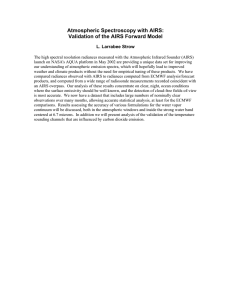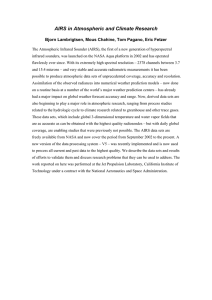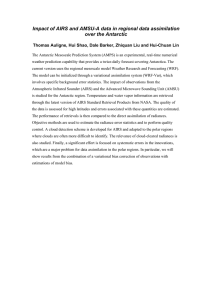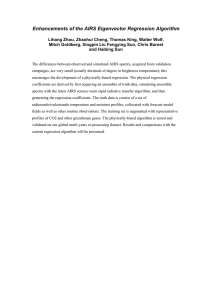Using water vapor measurements from hyperspectral forecast
advertisement
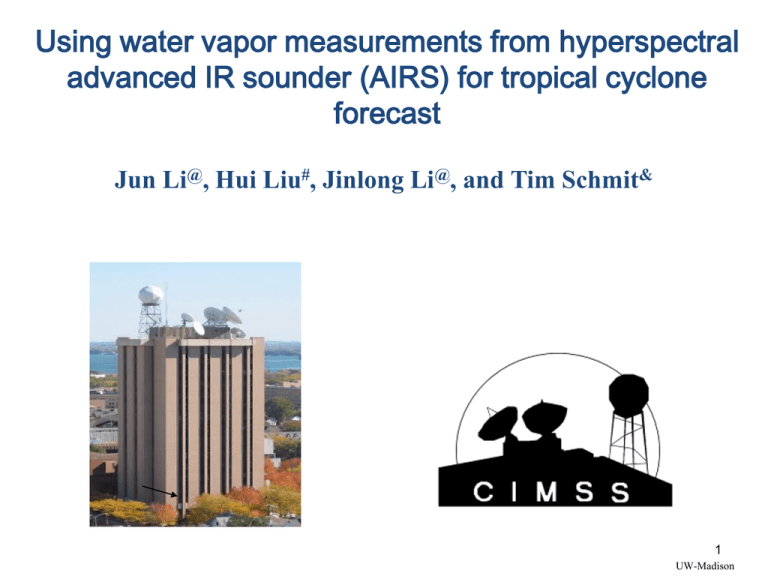
Using water vapor measurements from hyperspectral advanced IR sounder (AIRS) for tropical cyclone forecast Jun Li@, Hui Liu#, Jinlong Li@, and Tim Schmit& 1 UW-Madison Impact of Satellite Data 2007 ECMWF Numerical Weather forecasting system 3/4 day 3 days Currently most important NWP instruments at ECMWF - Advanced infrared sounders - Microwave sounders/imagers - GPS transmitters/receivers - GEO IR imagers/sounders - Scatterometers - UV/VIS/IR spectrometers from Peter Bauer, ECMWF, 9/2009 2 2 AIRS+IASI contribute to 23.8% error reduction 4 AMSU-A contribute to 17.2% error reduction RAOBs contribute to 7.9% error reduction The order of the top five and their contribution to error reduction is: AMSU-A (4 satellites) 17.2% IASI (one satellite) 12.0% AIRS (one satellite) 11.8% AIRREP (aircraft temperature and winds) 9.3% GPSRO (bending angles) 8.5% TEMP (radiosonde winds, humidity, and temperatures) 7.9% QuikSCAT (scatterometer surface winds over the oceans) 5.2% 3 3 Pre-convection environment for Zhou Qu storm • The Zhou Qu storm (7 – 8 August 2010) caused 1435 death, and 435 missing according report of Xinhua News. • Weather briefing:From 10 UTC on 07 August to 00 UTC on 08 August 2010, severe storm brought heavy local precipitation to Zhou Qu county, Gansu Province in China,the maximum rain rate is 77.3 mm. 4 AIRS full spatial resolution for Zhou Qu storm • AIRS full spatial resolution soundings are derived with CIMSS hyperspectral IR sounding retrieval (CHISR) algorithm • AIRS (SFOV soundings) detected atmospheric instability for storm development 5.5 hours before the storm development for Zhou Qu case • Atmospheric lifted index (LI) is used to indicate the atmospheric instability 5 LI = T500 – Taa 0< LI stable -3< LI <0 marginally unstable -6< LI <-3 moderately unstable -9< LI <-6 very unstable LI <-9 extreme instability AIRS (SFOV soundings) detected atmospheric instability for Zhou Qu storm 5.5 hours pre-convection Lat=34.19; Lon=104.41 0635UTC on 07 August 2010 (storm starts 12 UTC on 07 August 2010) (K) Zhou Qu storm Cold and dry air Warm and moist air 2015 UTC 07 August 2010 AIRS SFOV 500 hPa temperature (K) (g/kg) 1840 UTC 07 August 2010 AIRS SFOV 500 hPa water vapor mixing ratio (g/kg) (K) Using full spatial resolution hyperspectral IR water vapor profiles for tropical cyclone forecast • Better use of water vapor measurements in global NWP satellites remains challenge (ΔR is always favorable for ΔT, not Δq) • Full spatial resolution water vapor profiles in environmental region is critical for tropical cyclone forecast with a high resolution regional NWP model • CIMSS Hyperspectral IR Sounding Retrieval (CHISR) algorithm has been develop for full spatial resolution temperature and moisture soundings from AIRS and IASI • Forecast of various hurricanes and typhoons using advanced full spatial resolution IR soundings is studied with NCAR WRF/DART system 8 Atmospheric InfraRed Sounder (AIRS) spatial coverage 9 AIRS proofs hyperspectral sounding capability AIRS resolves absorption features in atmospheric windows enabling detection of temperature inversions – warming with height evident from spikes up Guess CIMSS Physical Guess CIMSS Physical Inversion 10 Li et al, 2006 11 AIRS full spatial resolution soundings used for hurricane and typhoon forecast • ~10 AIRS granules over the regional WRF domain • Full spatial resolution AIRS soundings (13.5 km at nadir) are derived using CHISR algorithm • Clear sky only soundings are used • Ensemble assimilation of AIRS soundings followed by ensemble forecast (36 km resolution) – CTL run: Assimilate radiosonde, satellite cloud winds, QuikSCAT winds, aircraft data, COSMIC GPS refractivity, ship, and land surface data. – Assimilation run: Same as CTL run plus AIRS full spatial resolution T and Q soundings 12 Hurricane Ike (2008) case: Retrieved 500mb temperature 2008.09.06 – Used in assimilation) (K) CIMSS/UW Clear sky AIRS SFOV temperature retrievals at 500 hPa on 06 September 2008, each pixel provides vertical temperature and moisture soundings. 13 Retrieved 500mb temperature (2008.09.07 - Used in assimilation) (K) (K) CIMSS/UW Clear sky AIRS SFOV temperature retrievals at 500 hPa on 07 September 2008, each pixel provides vertical temperature and moisture soundings. Statistics for Ike (2008) case 100 AIRS retrieval (CIMSS) AIRS retrieval (NASA) 100 300 400 500 200 300 400 500 600 600 700 800 900 1000 700 800 900 1000 -20 -10 0 10 20 Relative humidity bias (%) Pressure (hPa) 200 Pressure (hPa) Pressure (hPa) 100 200 300 400 500 600 700 800 900 1000 4.0e+4 0 5 10 15 20 25 Relative humidity STD (%) Comparisons with ECMWF analysis 30 6.0e+4 8.0e+4 1.0e+5 Number of samples 1.2e+ Tracks of ensemble mean analysis on Hurricane IKE CTL run: Assimilate radiosonde, satellite cloud winds, aircraft data, and surface data. AIRS Li and Liu 2009 (GRL) Analysis from 06 UTC 6 to 00UTC 8 September 2008 16 Track errors of on Hurricane IKE Li and Liu 2009 (GRL) Analysis from 06 UTC 6 to 00UTC 8 September 2008 17 SLP Intensity on Hurricane IKE Li and Liu 2009 (GRL) Analysis from 06 UTC 6 to 00UTC 8 September 2008 19 Forecast Experiments on Ike (2008) • 4-day ensemble forecasts (16 members) from the analyses on 00UTC 8 September 2008. • Track trajectory and hurricane surface central pressure are compared (every 6-hourly in the plots). 21 Tracks of 96h forecasts on Hurricane IKE CTRL run: Assimilate radiosonde, satellite AIRS cloud winds, aircraft data, and surface data. With AIRS No AIRS Red is observation, green is forecast Forecasts start at 00 UTC 8 September 2008 Track errors of 96 h forecasts Without AIRS With AIRS Li and Liu 2009 (GRL) Forecasts start at 00 UTC 8 September 2008 23 Typhoon Sinlaku (2008) Fact Sinlaku Path Sinlaku rapid intensification observed 24 (g/kg) (K) 700 hPa water vapor mixing ratio (g/kg) (Sinlaku – 10 September 2008) GEO advanced IR sounder can provide more clear sky soundings in south environment through frequent observations ! 25 Forecast Experiments on Sinlaku • 2-day ensemble forecasts (16 members) from the analyses on 12UTC 9 September 2008. • Track trajectory and hurricane surface central pressure are compared (every 6-hourly in the plots). 26 Tracks of 48h forecasts on Sinlaku CTRL run: Assimilate radiosonde, satellite cloud winds, aircraft data, and surface data. CTRL CIMSS With AIRS Without AIRS Red: observations Green: forecast Hui Liu (NCAR) and Jun Li (CIMSS) Liu and Li 2010 (JAMC) Forecasts start at 12 UTC 9 September 2008 27 Impact of AIRS on Typhoon Sinlaku (2008) track forecast with full spatial resolution temperature soundings and moisture soundings, respectively. Typhoon Sinlaku (2008) track forecast error with AIRS full spatial resolution temperature soundings and moisture soundings, respectively. 28 References • Li, J., H. Liu, 2009: Improved hurricane track and intensity forecast using single field-of-view advanced IR sounding measurements, Geophysical Research Letters, 36, L11813, doi:10.1029/2009GL038285. • Liu, H., and J. Li, 2010: An improvement in forecast of rapid intensification of typhoon Sinlaku (2008) using clear sky full spatial resolution advanced IR soundings, Journal of Applied Meteorology and Climate (in press) 29 AIRS measurements overlay on GOES IR image (Hurricane Dean) LEO data have limitation on monitoring weather due to orbital gap and low temporal resolution. GEO can provide data anytime for weather event, not LEO ! High temporal resolution is unique aspect of GEO measurements 30
